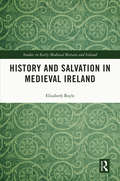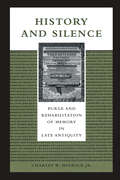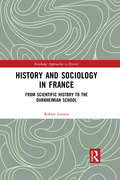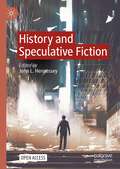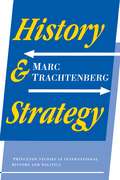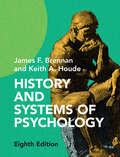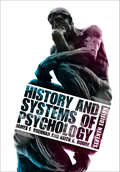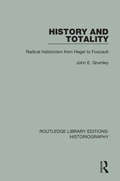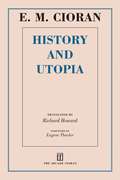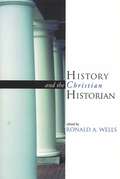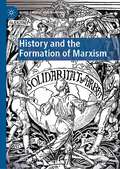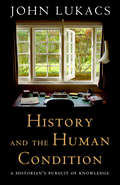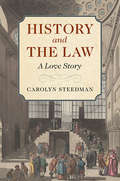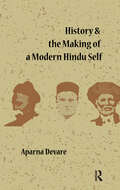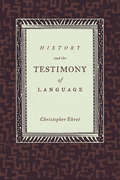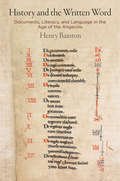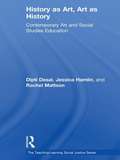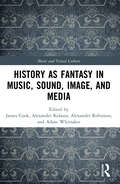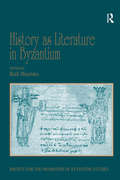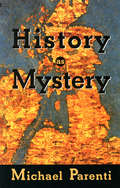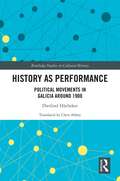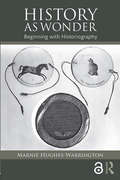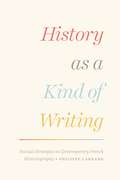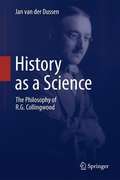- Table View
- List View
History and Salvation in Medieval Ireland (Studies in Early Medieval Britain and Ireland)
by Elizabeth BoyleHistory and Salvation in Medieval Ireland explores medieval Irish conceptions of salvation history, using Latin and vernacular sources from c. 700–c. 1200 CE which adapt biblical history for audiences both secular and ecclesiastical. This book examines medieval Irish sources on the cities of Jerusalem and Babylon; reworkings of narratives from the Hebrew Scriptures; literature influenced by the Psalms; and texts indebted to Late Antique historiography. It argues that the conceptual framework of salvation history, and the related theory of the divinely-ordained movement of political power through history, had a formative influence on early Irish culture, society and identity. Primarily through analysis of previously untranslated sources, this study teases out some of the intricate connections between the local and the universal, in order to situate medieval Irish historiography within the context of that of the wider world. Using an overarching biblical chronology, beginning with the lives of the Jewish Patriarchs and ending with the Christian apostolic missions, this study shows how one culture understood the histories of others, and has important implications for issues such as kingship, religion and literary production in medieval Ireland. This book will appeal to scholars and students of medieval Ireland, as well as those interested in religious and cultural history.
History and Silence: Purge and Rehabilitation of Memory in Late Antiquity
by Charles W. Hedrick&“It is so rare and refreshing to read a Roman history book which recognizes and celebrates the sheer difficulty of writing history&” (The Times Literary Supplement). The ruling elite in ancient Rome sought to eradicate even the memory of their deceased opponents through a process now known as damnatio memoriae. These formal and traditional practices included removing the person&’s name and image from public monuments and inscriptions, making it illegal to speak of him, and forbidding funeral observances and mourning. Paradoxically, however, while these practices dishonored the person's memory, they did not destroy it. Indeed, a later turn of events could restore the offender not only to public favor but also to re-inclusion in the public record. This book examines the process of purge and rehabilitation of memory in the person of Virius Nicomachus Flavianus. Charles Hedrick describes how Flavianus was condemned for participating in the rebellion against the Christian emperor Theodosius the Great—and then restored to the public record a generation later as members of the newly Christianized senatorial class sought to reconcile their pagan past and Christian present. By selectively remembering and forgetting the actions of Flavianus, Hedrick asserts, the Roman elite honored their ancestors while participating in profound social, cultural, and religious change. &“One of the most interesting and original books about the Later Roman Empire that I have ever read.&” —T. D. Barnes
History and Sociology in France: From Scientific History to the Durkheimian School (Routledge Approaches to History #23)
by Robert LerouxIn the late 19th century and early part of the 20th, with the coming of age of sociology in France, the idea that there could be a “science” of history was the subject of much and varied debate. The methodological problems surrounding historical knowledge that were debated throughout this period concerned not only scientific history, but the social sciences as well, and sociology more specifically. Although sociology was from its origins in competition with the discipline of history, from the outset, it too was interested in history as a form of objective knowledge. Many of sociology's founders believed that by retracing historical processes, they could make a clean break with abstraction and metaphysics. For their part, historians generally remained hostile to any kind of systematization. And yet, at the end of the 19th century, the science of history would draw some valuable lessons from the emerging methodology of sociology. It was in large part under the impetus of the issues and problems raised by the philosopher Henri Berr and by the Durkheimian School, with the economist François Simiand as its lead protagonist, that the community of historians, increasingly aware of the limits of narrative history, turned so enthusiastically to social and economic history – just as Durkheim and his disciples consulted history in order to avoid the twin pitfalls of the philosophy of history and of introspective psychology. History and Sociology in France focuses on this dialogue of the two neighboring sciences.
History and Speculative Fiction
by John L. HennesseyThis open access book demonstrates that despite different epistemological starting points, history and speculative fiction perform similar work in “making the strange familiar” and “making the familiar strange” by taking their readers on journeys through space and time. Excellent history, like excellent speculative fiction, should cause readers to reconsider crucial aspects of their society that they normally overlook or lead them to reflect on radically different forms of social organization. Drawing on Gunlög Fur’s postcolonial concept of concurrences, and with contributions that explore diverse examples of speculative fiction and historical encounters using a variety of disciplinary approaches, this volume provides new perspectives on colonialism, ecological destruction, the nature of humanity, and how to envision a better future.
History and Strategy (Studies in Intellectual History and the History of Philosophy #1)
by Marc TrachtenbergThis work is a powerful demonstration of how historical analysis can be brought to bear on the study of strategic issues, and, conversely, how strategic thinking can help drive historical research. Based largely on newly released American archives, History and Strategy focuses on the twenty years following World War II. By bridging the sizable gap between the intellectual world of historians and that of strategists and political scientists, the essays here present a fresh and unified view of how to explore international politics in the nuclear era. The book begins with an overview of strategic thought in America from 1952 through 1966 and ends with a discussion of "making sense" of the nuclear age. Trachtenberg reevaluates the immediate causes of World War I, studies the impact of the shifting nuclear balance on American strategy in the early 1950s, examines the relationship between the nuclearization of NATO and U.S.-West European relations, and looks at the Berlin and the Cuban crises. He shows throughout that there are startling discoveries to be made about events that seem to have been thoroughly investigated.
History and Systems of Psychology
by James F. Brennan Keith A. HoudeHistory and Systems of Psychology provides an engaging introduction to the rich story of psychology's past. Retaining its trademark clarity and accessibility, the Eighth Edition also features expanded coverage of non-western traditions in psychology as well as added coverage of nineteenth-century advances in philosophy and science. The emergence of applications of psychology in clinical, educational, neuroscientific, and social settings are further emphasized within the twenty-first-century landscape of psychology as a cognitive and a positive science. Assuming little prerequisite knowledge, the authors discuss the people, places, and concepts that have shaped psychology's story, and show that we remain fascinated and perplexed by the same enduring questions that confronted our ancestors – namely, our wonder at our subjectivity and consciousness of self. The Eighth Edition is supported by rich online resources including a manual, test bank, and lecture slides for instructors, and study guides and links to primary source literature for students.
History and Systems of Psychology: Pearson New International Edition
by James F. Brennan Keith A. HoudeComprehensive yet accessible, a classic survey of the history and systems of psychology -- from pre-Socratic philosophers to contemporary contributions from cognitive science and neuroscience is presented. Part I traces psychology's historical foundations from its beginnings to its emergence as a formal discipline in the 1870s. Part II deals with the major twentieth-century systems of psychology.
History and Totality: Radical Historicism From Hegel to Foucault (Routledge Library Editions: Historiography)
by John GrumleyIn this work, originally published in 1989, the author establishes a tradition of radical historicism from Hegel to the Budapenst School. He charts both its continuous evolution from the early 19th century to the late 20thh, and its transformation in the context of European social, economic and cultural change. Through a reappraisal of historical interpretation from Hegel to Foucault, the book demonstrates the contemporary relevance of radical historicism. It includes detailed analyses of Marx, Dilthey, Simmel, Weber, Lukácks, Horkheimer, Adorno and Habermas.
History and Utopia
by Richard Howard E. M. Cioran Eugene Thacker"Only a monster can allow himself the luxury of seeing things as they are," writes E. M. Cioran, the Romanian-born philosopher who has rightly been compared to Samuel Beckett.In History and Utopia, Cioran the monster writes of politics in its broadest sense, of history, and of the utopian dream. His views are, to say the least, provocative. In one essay he casts a scathing look at democracy, that "festival of mediocrity"; in another he turns his uncompromising gaze on Russia, its history, its evolution, and what he calls "the virtues of liberty." In the dark shadow of Stalin and Hitler, he writes of tyrants and tyranny with rare lucidity and convincing logic. In "Odyssey of Rancor," he examines the deep-rooted dream in all of us to "hate our neighbors," to take immediate and irremediable revenge. And, in the final essay, he analyzes the notion of the "golden age," the biblical Eden, the utopia of so many poets and thinkers.
History and Value: The Clarendon Lectures and the Northcliffe Lectures 1987
by Frank KermodeUniversity lectures on literature and art
History and the Christian Historian
by Ronald A. WellsThis volume arises out of special concerns of historians who are also Christians. What case can be made for connecting historical work and religious convictions? What is the relation of faith to history? What difference could Christian perspectives make in historical study? Thirteen respected scholars — including some who have changed the face of history writing in the twentieth century — here take up a diversity of subjects in giving a provisional answer to these important questions. In exploring foundational issues of perspective and theory, engaging discrete themes such as feminism, puritanism, and missiology, and discussing the application of religious insights in teaching history, this excellent collection of essays forthrightly addresses the &“epistemological crisis&” brought on by the postmodern critique of truth and demonstrates the positive implications of a Christian perspective for the study of history and historiography.
History and the Formation of Marxism (Marx, Engels, and Marxisms)
by Bertel NygaardThis book redefines the relationship between Marxism and history. At its roots, Marxism was aimed at analyzing society in order to change it, reflecting on the past to create the ‘poetry of the future.’ No single event of the past was as important to early Marxists as the French Revolution of 1789. Studying the varying uses of the history of that past event among Karl Marx, Friedrich Engels, and prominent European Marxists before 1914 (Karl Kautsky, V.I. Lenin, and others), this book argues that we should take the historiography of concrete past events seriously. It was not only an auxiliary element of Marxism, but a core constitutive element in its formation. Thus, this book calls for transcending traditional approaches to Marxism as a fixed set of social theories combined with strategies for the present and future. Important to students of Marxism, the labor movement, and the French Revolution alike, this study contains refreshing perspectives on the interplay between past, present, and future and on the role of states, social classes, socio-economic determination, and political organization in history.
History and the Human Condition: A Historian's Pursuit of Knowledge
by John LukacsIn a career spanning more than sixty-five years, John Lukacs has established himself as one of our most accomplished historians. Now, in the stimulating book History and the Human Condition, Lukacs offers his profound reflections on the very nature of history, the role of the historian, the limits of knowledge, and more.Guiding us on a quest for knowledge, Lukacs ranges far and wide over the past two centuries. The pursuit takes us from Alexis de Tocqueville to the atomic bomb, from American &“exceptionalism&” to Nazi expansionism, from the closing of the American frontier to the passing of the modern age.Lukacs&’s insights about the past have important implications for the present and future. In chronicling the twentieth-century decline of liberalism and rise of conservatism, for example, he forces us to rethink the terms of the liberal-versus-conservative debate. In particular, he shows that what passes for &“conservative&” in the twenty-first century often bears little connection to true conservatism.Lukacs concludes by shifting his gaze from the broad currents of history to the world immediately around him. His reflections on his home, his town, his career, and his experiences as an immigrant to the United States illuminate deeper truths about America, the unique challenges of modernity, the sense of displacement and atomization that increasingly characterizes twenty-first-century life, and much more. Moving and insightful, this closing section focuses on the human in history, masterfully displaying how right Lukacs is in his contention that history, at its best, is personal and participatory.History and the Human Condition is a fascinating work by one of the finest historians of our time. More than that, it is perhaps John Lukacs&’s final word on the great themes that have defined him as a historian and a writer.
History and the Law: A Love Story
by Carolyn SteedmanFocusing on everyday legal experiences, from that of magistrates, novelists and political philosophers, to maidservants, pauper men and women, down-at-heel attorneys and middling-sort wives in their coverture, History and the Law reveals how people thought about, used, manipulated and resisted the law between the eighteenth and the twentieth centuries. Supported by clear, engaging examples taken from the historical record, and from the writing of historians including Laurence Sterne, William Godwin, and E. P. Thompson, who each had troubled love affairs with the law, Carolyn Steedman puts the emphasis on English poor laws, copyright law, and laws regarding women. Evocatively written and highly original, History and the Law accounts for historians' strange ambivalent love affair with the law and with legal records that appear to promise access to so many lives in the past.
History and the Making of a Modern Hindu Self
by Aparna DevareTaking the contentious debates surrounding historical evidence and history writing between secularists and Hindu nationalists as a starting point, this book seeks to understand the origins of a growing historical consciousness in contemporary India, especially amongst Hindus. The broad question it poses is: Why has ‘history’ become such an important site of identity, conflict and self-definition amongst modern Hindus, especially when Hinduism is known to have been notoriously impervious to history? As modern ideas regarding notions of history came to India with colonialism, it turns to the colonial period as the ‘moment of encounter’ with such ideas. The book examines three distinct moments in the Hindu self through the lives and writings of lower-caste public figure Jotiba Phule, ‘moderate’ nationalist M. G. Ranade and Hindu nationalist V. D. Savarkar. Through a close reading of original writings, speeches and biographical material, it is demonstrated that these three individuals were engaged with a modern historical and rationalist approach. However, the same material is also used to argue that Phule and Ranade viewed religion as living, contemporaneous and capable of informing both their personal and political lives. Savarkar, the ‘explicitly Hindu’ leader, on the contrary, held Hindu practices and traditions in contempt, confining them to historical analysis while denying any role for religion as spirituality or morality in contemporary political life. While providing some historical context, this volume highlights the philosophical/ political ideas and actions of the three individuals discussed. It integrates aspects of their lives as central to understanding their politics.
History and the Testimony of Language
by Christopher EhretThis book is about history and the practical power of language to reveal historical change. Christopher Ehret offers a methodological guide to applying language evidence in historical studies. He demonstrates how these methods allow us not only to recover the histories of time periods and places poorly served by written documentation, but also to enrich our understanding of well-documented regions and eras. A leading historian as well as historical linguist of Africa, Ehret provides in-depth examples from the language phyla of Africa, arguing that his comprehensive treatment can be applied by linguistically trained historians and historical linguists working with any language and in any area of the world.
History and the Written Word: Documents, Literacy, and Language in the Age of the Angevins (The Middle Ages Series)
by Henry BaintonComing upon the text of a document such as a charter or a letter inserted into the fabric of a medieval chronicle and quoted in full or at length, modern readers might well assume that the chronicler is simply doing what good historians have always done—that is, citing his source as evidence. Such documentary insertions are not ubiquitous in medieval historiography, however, and are in fact particularly characteristic of the history-writing produced by the Angevins in England and Northern France in the later twelfth century.In History and the Written Word, Henry Bainton puts these documentary gestures center stage in an attempt to understand what the chroniclers were doing historiographically, socially, and culturally when they transcribed a document into a work of history. Where earlier scholars who have looked at the phenomenon have explained this increased use of documents by considering the growing bureaucratic state and an increasing historiographical concern for documentary evidence, Bainton seeks to resituate these histories, together with their authors and users, within literate but sub-state networks of political power. Proposing a new category he designates "literate lordship" to describe the form of power with which documentary history-writing was especially concerned, he shows how important the vernacular was in recording the social lives of these literate lords and how they found it a particularly appropriate medium through which to record their roles in history.Drawing on the perspectives of modern and medieval narratology, medieval multilingualism, and cultural memory, History and the Written Word argues that members of an administrative elite demonstrated their mastery of the rules of literate political behavior by producing and consuming history-writing and its documents.
History as Art, Art as History: Contemporary Art and Social Studies Education
by Rachel Mattson Dipti Desai Jessica HamlinHistory as Art, Art as History pioneers methods for using contemporary works of art in the social studies and art classroom to enhance an understanding of visual culture and history. The fully-illustrated interdisciplinary teaching toolkit provides an invaluable pedagogical resource—complete with theoretical background and practical suggestions for teaching U.S. history topics through close readings of both primary sources and provocative works of contemporary art. History as Art, Art as History is an experientially grounded, practically minded pedagogical investigation meant to push teachers and students to think critically without sacrificing their ability to succeed in a standards-driven educational climate. Amid the educational debate surrounding rigid, unimaginative tests, classroom scripts, and bureaucratic mandates, this innovative book insists on an alternate set of educational priorities that promotes engagement with creative and critical thinking. Features include: A thought-provoking series of framing essays and interviews with contemporary artists address the pivotal questions that arise when one attempts to think about history and contemporary visual art together. An 8-page, full color insert of contemporary art, plus over 50 black and white illustrations throughout. A Teaching Toolkit covering major themes in U.S. history provides an archive of suggested primary documents, plus discussion suggestions and activities for putting theory into practice. Teaching activities keyed to the social studies and art curricula and teaching standards Resources include annotated bibliographies for further study and lists of arts and media organizations. This sophisticated yet accessible textbook is a must-read resource for any teacher looking to draw upon visual and historical texts in their teaching and to develop innovative curriculum and meaningful student engagement.
History as Fantasy in Music, Sound, Image, and Media (Music and Visual Culture)
by James Cook, Alexander Kolassa, Alexander Robinson, and Adam WhittakerExploring how music is used to portray the past in a variety of media, this book probes the relationship between history and fantasy in the imagination of the musical past. The volume brings together essays from multidisciplinary perspectives, addressing the use of music to convey a sense of the past in a wide range of multimedia contexts, including television, documentaries, opera, musical theatre, contemporary and historical film, videogames, and virtual reality. With a focus on early music and medievalism, the contributors theorise the role of music and sound in constructing ideas of the past. In three interrelated sections, the chapters problematise notions of historical authenticity on the stage and screen; theorise the future of musical histories in immersive and virtual media; and explore sound’s role in more fantastical appropriations of history in television and videogames. Together, they poseprovocative questions regarding our perceptions of ‘early’ music and the sensory experience of distant history. Offering new ways to understand the past at the crossroads of musical and visual culture, this collection is relevant to researchers across music, media, and historical and cultural studies.
History as Literature in Byzantium: Papers from the Fortieth Spring Symposium of Byzantine Studies, University of Birmingham, April 2007 (Publications of the Society for the Promotion of Byzantine Studies #15)
by Ruth MacridesAlthough perceived since the sixteenth century as the most impressive literary achievement of Byzantine culture, historical writing nevertheless remains little studied as literature. Historical texts are still read first and foremost for nuggets of information, as main sources for the reconstruction of the events of Byzantine history. Whatever can be called literary in these works has been considered as external and detachable from the facts. The 'classical tradition' inherited by Byzantine writers, the features that Byzantine authors imitated and absorbed, are regarded as standing in the way of understanding the true meaning of the text and, furthermore, of contaminating the reliability of the history. Chronicles, whose language and style are anything but classicizing, have been held in low esteem, for they are seen as providing a mere chronological exposition of events. This book presents a set of articles by an international cast of contributors, deriving from papers delivered at the 40th annual Spring Symposium of Byzantine Studies. They are concerned with historical and visual narratives that date from the sixth to the fourteenth century, and aim to show that literary analyses and the study of pictorial devices, far from being tangential to the study of historical texts, are preliminary to their further study, exposing the deeper structures and purposes of these texts.
History as Mystery
by Michael ParentiEssays on how history's victors distort and suppress the documentary record in order to perpetuate their power and privilege, and how historians are influenced by the professional and class environment in which they work. "Michael Parenti, always provocative and eloquent, gives us a lively as well as valuable critique of orthodoxy posing as 'history. '"-Howard Zinn"Solid if surely controversial stuff. "- Kirkus Table of Contents Prologue: Against the Mainstream History as Miseducation Mainstream Orthodoxy The Hunt for Real History Textbooks: America the Beautiful For Business, Against Labor The School as a Tool Priests and Pagans, Saints and Slaves Triumph of the One True Faith Silencing the Pagans Accepting the Powers that Be Affluent Believers Saints For Slavery Bishops and Barbarians, Jezebels and Jews The Myth of the Devout Peasant The Curse of Eve The Burning of Books Preparing the Holocaust History in the Faking Suppression at the Point of OriginCold War in the Archives Classified History, USA Listening to the Muted Masses In Ranke's Footsteps His Majesty's Servant An Aristocratic Profession' Purging the Reds Publishing and Privishing' Marketing the Right Stuff The Strange Death of President Zachary Taylor, a Study in the Manufacture of Mainstream History Examining the Examination Confrontation with the Slavocracy A lethal Dose of Cherries and Milk? Honorable Men and Official History Against Psychopolitics Depoliticizing the Political Dubious Clinical Data Lenin as Oedipus The Compulsive Hoover The Political Hoover When the Political Becomes Personal Afterword
History as Performance: Political Movements in Galicia Around 1900 (Routledge Studies in Cultural History #93)
by Dietlind HüchtkerThis study analyzes history as performance: as the interaction of actors, plays, stages and enactments. By this, it examines women’s politics in Habsburg Galicia around 1900: a Polish woman active in the peasant movement, a Ukrainian feminist, and a Jewish Zionist. It shows how the movements constructed essentialistically regarded collectives, experience as a medially comprehensible form of credibility, and a historically based inevitability of change, and legitimized participation and intervention through social policy and educational practices. Traits shared by the movements included the claim to interpretive sovereignty, the ritualization of participation, and the establishment of truths about past and future.
History as Wonder: Beginning with Historiography
by Marnie Hughes-WarringtonHistory and Wonder is a refreshing new take on the idea of history that tracks the entanglement of history and philosophy over time through the key idea of wonder. From Ancient Greek histories and wonder works, to Islamic curiosities and Chinese strange histories, through to European historical cabinets of curiosity and on to histories that grapple with the horrors of the Holocaust, Marnie Hughes-Warrington unpacks the ways in which historians throughout the ages have tried to make sense of the world, and to change it. This book considers histories and historians across time and space, including the Ancient Greek historian Polybius, the medieval texts by historians such as Bede in England and Ibn Khaldun in Islamic Historiography, and the more recent works by Martin Heidegger, Luce Irigaray and Ranajit Guha among others. It explores the different ways in which historians have called upon wonder to cross boundaries between the past and the present, the universal and the particular, the old and the new, and the ordinary and the extraordinary. Promising to both delight and unsettle, it shows how wonder works as the beginning of historiography. Accessible, engaging and wide-ranging, History as Wonder provides an original addition to the field of historiography that is ideal for those both new to and familiar with the study of history.
History as a Kind of Writing: Textual Strategies in Contemporary French Historiography
by Philippe CarrardIn academia, the traditional role of the humanities is being questioned by the “posts”—postmodernism, poststructuralism, and postfeminism—which means that the project of writing history only grows more complex. In History as a Kind of Writing, scholar of French literature and culture Philippe Carrard speaks to this complexity by focusing the lens on the current state of French historiography. Carrard’s work here is expansive—examining the conventions historians draw on to produce their texts and casting light on views put forward by literary theorists, theorists of history, and historians themselves. Ranging from discussions of lengthy dissertations on 1960s social and economic history to a more contemporary focus on events, actors, memory, and culture, the book digs deep into the how of history. How do historians arrange their data into narratives? What strategies do they employ to justify the validity of their descriptions? Are actors given their own voice? Along the way, Carrard also readdresses questions fundamental to the field, including its necessary membership in the narrative genre, the presumed objectivity of historiographic writing, and the place of history as a science, distinct from the natural and theoretical sciences.
History as a Science
by Jan Van DussenSince its appearance in 1981 History as a Science has been welcomed as a coherent and comprehensive review and analysis of the many aspects of Collingwood's philosophy of history, the development of his views, and their reception. The book was the first to pay extensive attention to Collingwood's unpublished manuscripts, and to his work as an archaeologist and historian. With the publication of this volume Jan van der Dussen, opened up a new angle in Collingwood studies. The republication of this volume meets an increasing demand to make the book available for future Collingwood scholars, and people interested in Collingwood's philosophy. Apart from verbal changes to improve readability and a new pagination, the manuscript is the same as the original.
